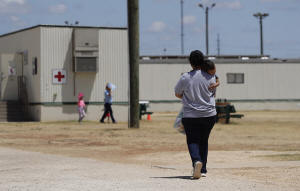|
U.S. District Judge Brian E. Murphy ruled that people with final
orders of removal must have “a meaningful opportunity” to argue
that being sent to a third country presents a level of danger
deemed worthy of protection. His order remains in effect until
the case advances to the next stage of arguments.
The decision is a setback for an administration that has sent
people to countries including Panama, Costa Rica and El Salvador
when it is difficult to deport them to their homelands. In some
cases a judge may determine that a person's homeland is too
dangerous but authorities can send them to a third country.
The Homeland Security Department did not immediately respond to
a request for comment, but administration attorneys argued that
a temporary halt would interfere with immigration enforcement.
Murphy, who was appointed by President Joe Biden, sided with
advocacy groups including the National Immigration Litigation
Alliance, which sued Sunday in Boston on behalf of people who
were transferred to third countries or feared they would be
soon.
One plaintiff, identified only by initials in court filings, is
a Guatemalan man who was sent to Mexico, where he says he was
previously raped. A U.S. immigration judge determined that it
was unsafe for him to go to Guatemala, but the man did not have
a chance to argue against being sent to Mexico. The man is
“hiding” in Guatemala.
An immigration judge ruled that another plaintiff could not be
returned to Honduras, but she fears she will be sent to a third
country when she appears for a mandatory check-in next week at
U.S. Immigration and Customs Enforcement offices in Dallas.
All contents © copyright 2025 Associated Press. All rights
reserved |
|




